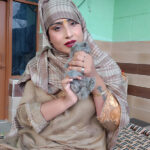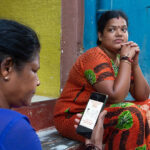I strongly believe that success can only be achieved by following one’s passion, combined with hard work, patience and perseverance.
That’s how I pioneered the production of biodegradable sanitary pads in Porvorim, Goa that are good not only for women’s health but also for the environment.
I was born in Kolhapur in Maharashtra.
In school, I was an all-rounder, excelling in academics and extracurricular activities. Be it playing badminton or kabbadi, or cultural programmes, I enthusiastically participated.
Always an achiever, I wanted to become a doctor.
But owing to my family’s conservative mindset, I couldn’t pursue my dreams of making a career in medicine.
I got married right after I finished my bachelor’s degree in electronics engineering.
My marriage took me to Goa. Then my husband and I moved to Mumbai. I enrolled for a master’s degree in computer management at Pune University when I was three-months pregnant.
My father was upset that I wanted to study more. That too by living alone in a new place, despite being married and pregnant.
But I was determined. And he came around when my first child was born.
Soon I got a job that involved travel across India.
In 2011 I quit my job and became a consultant. We’d also moved back to Goa by then.
I’d also been working with rural women for many years, to make them self-reliant and improve their menstrual health.
It was such a proud moment when Maneka Gandhi nominated me as an ambassador for Nirmal Raksha Abhiyan – a part of Swachh Bharat Abhiyan – in 2018.
As an ambassador I had to ensure menstrual hygiene and the clean disposal of sanitary pads.
I wanted to educate young girls and dispel myths, so I began conducting awareness sessions. Sometimes I had to ask the men to leave so that the women wouldn’t feel awkward talking about periods and pads.
They were so embarrassed to talk about menstruation. It’s a taboo subject.
Around the same time I also learned about biodegradable sanitary pads. It was a concept that only existed on paper.
So in 2018 I became determined to make some myself. I wanted to make biodegradable pads, employ local women, empower them and improve the rural economy.
My family was supportive. But I faced a lot of difficulties getting the necessary licenses, certificates and loan to set up my factory. Men were judging my capabilities as I was venturing into a man’s domain.
But finally, in July 2020, I got the go-ahead. Within six months I started manufacturing Josa – corn-based biodegradable sanitary pads.
I’d like my factory to be a learning ground for budding entrepreneurs. So I often invite students and young women to come and have a look.
I’ve had positive feedback about Josa – from being lightweight to having better absorbency. And more importantly preventing rashes! So I’m happy that Josa ensures better hygiene and is also eco-friendly.
By the way, Josa in Sanskrit means ‘woman.’
Today, more than two lakh women in Goa use Josa.
I must add that in 2018, the number of women of menstruating age in Goa was six lakh. You can do the math.
As part of my company’s corporate social responsibility, I distribute our pads free of cost to girls in government and private schools and also in the villages.
To continue creating awareness on menstrual health and hygiene, I’ve founded the Green Trust Goa.
I intend to take Josa to other states.
And eventually overseas.
Want to have an uninhibited talk about menstruation? Try the “Hello Saathi” helpline from Uninhibited, a menstrual health organization.











